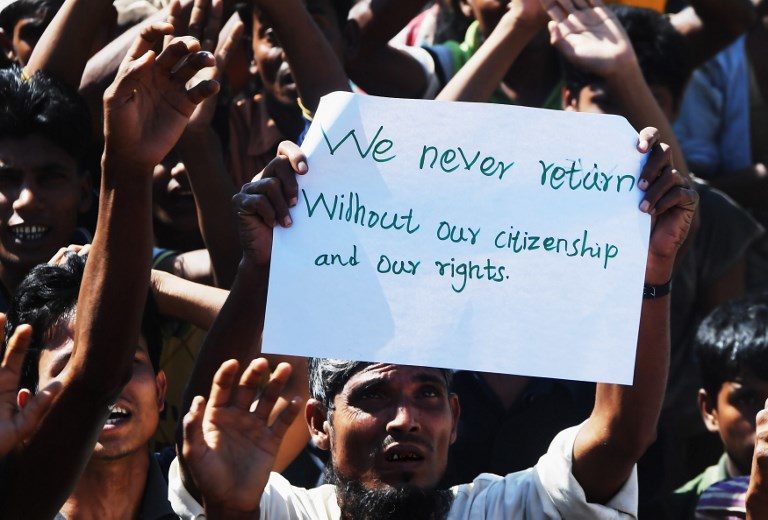A UN-created “safe zone” for Rohingya refugees in Myanmar’s western Rakhine State, floated in recent weeks by Bangladesh’s foreign minister, appears nowhere near reality despite reports to the contrary in Bangladeshi media.
Myanmar’s embassy in Bangladesh joined with China’s embassy to Myanmar yesterday in slamming a Sunday report by online news outlet Banglanews24, which claimed that China had signed off on a plan for a safe zone, one that would ostensibly be created in conjunction with ASEAN member states.
“The article of Banglanews24 is totally baseless, distorted and contrasts with real on-ground situation,” reads the statement on the Myanmar Embassy in Dhaka’s Facebook page.
“Publishing such kind of fake news may lead to misunderstanding between the two countries and would not contribute towards the bilateral efforts of Myanmar and Bangladesh trying to resolve the displaced people issue amicably.”
https://www.facebook.com/medhakaofficial/posts/2049477631795704
The statement goes on to reiterate that the Myanmar government has always been opposed to the establishment of a safe zone inside Myanmar’s sovereign territory, and that neither China nor any ASEAN member had given their consent to its creation.
Bangladesh first proposed the creation of safe zones for the displaced Rohingya minority in September 2017 at the 72nd session of the UN General Assembly, one month after the brutal August 2017 military campaign that drove more than 700,000 Rohingya Muslims into the neighboring country.
Bangladesh Prime Minister Sheikh Hasina at the time called on Myanmar to “unconditionally stop the violence and the practice of ethnic cleansing in the Rakhine State immediately and forever.”
She also proposed sending a fact-finding mission to Myanmar and to “ensure the sustainable return of all forcibly displaced Rohingya in Bangladesh to their homes in Myanmar.”
That proposal found a dead end in the UN Security Council (UNSC), where China and Russia have blocked any proposed actions against Myanmar.
The UNSC is the only UN body that can deploy an international peacekeeping force, a necessity for maintaining a so-called safe zone.
Just two weeks ago, Bangladeshi Foreign Minister AK Abdul Momen called on Russia, China and India to tackle the Rohingya issue by reiterating their safe zone proposal.
“If a safe zone is created under the vigilance of China, Russia and India along with the ASEAN states, Rohingya people will be encouraged to return to their own land,” he said in an interview with the Anadolu News Agency.
However, experts conceded early on that the proposal dependent on the good will of regional giants China and India for its successful implementation and enforcement.
Safe zones have been a far less effective diplomatic solution than many realize. They rarely live up to their name even with UN peacekeeping forces on the ground.
“Historically, safe zones aren’t safe. Even if the Myanmar military agreed to create one, there are no indicators that the authorities would in turn ensure Rohingya rights. A safe zone would further entrench the apartheid of northern Rakhine State – into a giant concentration camp,” Matthew Smith, co-founder and chief executive at Fortify Rights told Coconuts Yangon.
The cases of Bosnia-Herzegovina and Sri Lanka further highlight the grim reality that “safe zones” can become dangerous and invite further violence. Moreover, even if not attacked, the zones can become isolated and restrictive, with limited humanitarian aid and the lack of freedom of movement.





Reader Interactions